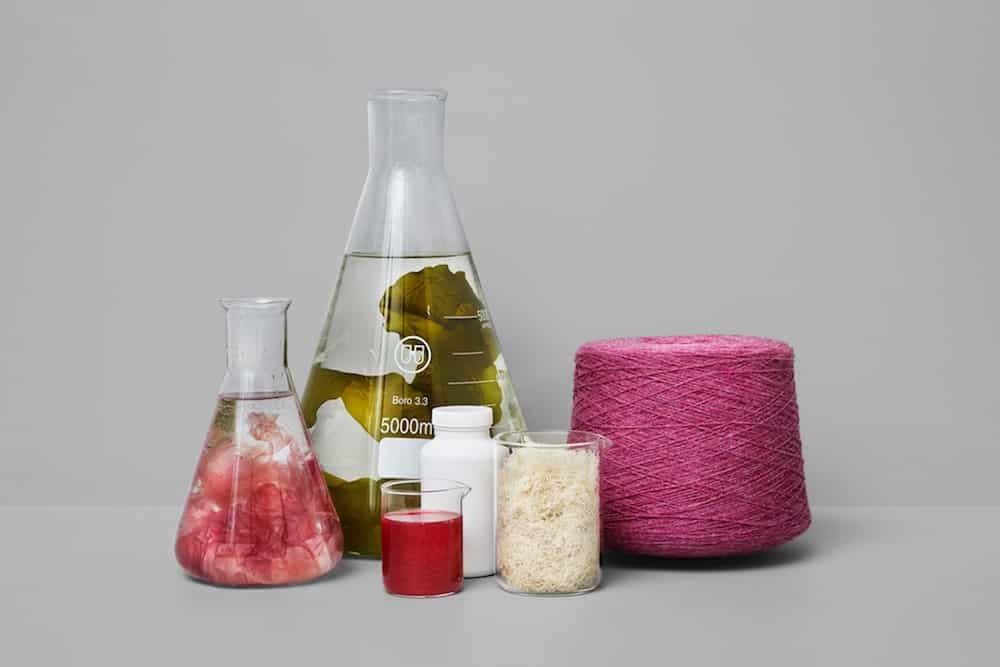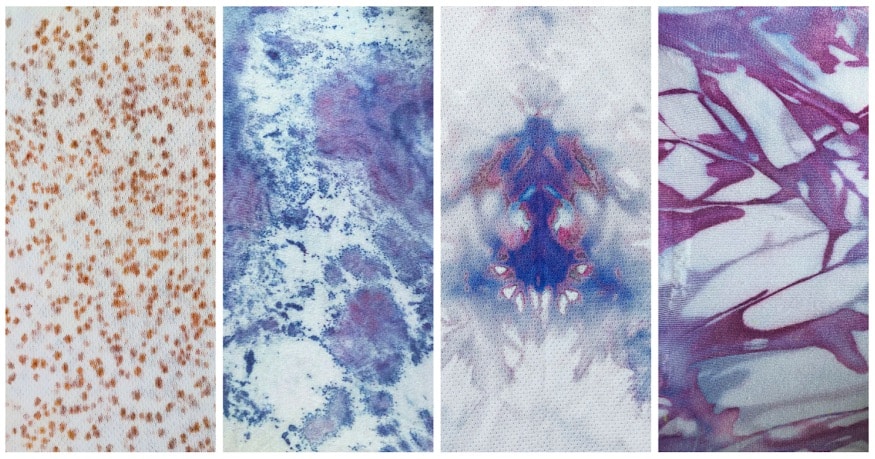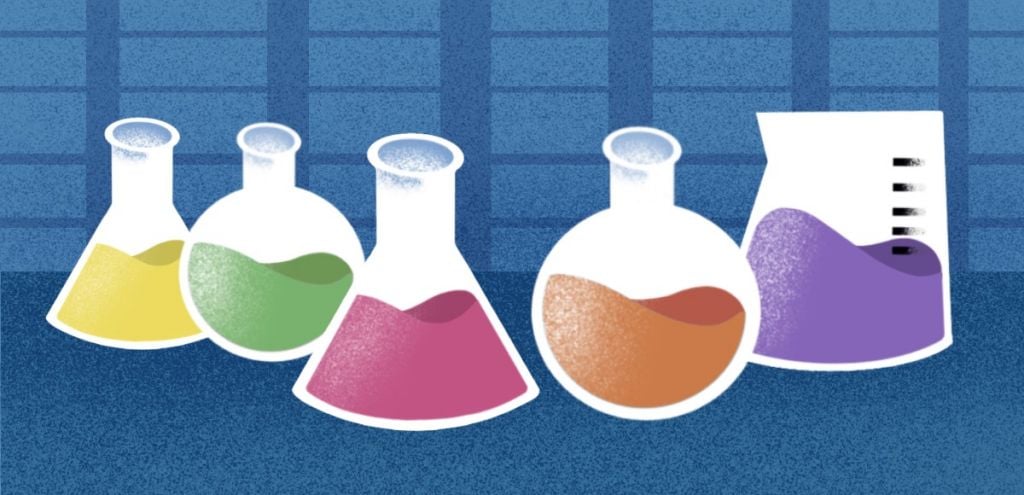Newsletter Signup - Under Article / In Page
"*" indicates required fields
The production of textile dyes and food colorants can have a big environmental footprint. Biotech startups are rising to the challenge by engineering bacteria, fungi, and algae to sustainably produce natural colors.
Eight years ago, University of Cambridge researcher Jim Ajioka was in Nepal helping to produce a biosensor to detect arsenic in drinking water and was shocked at how poor the water quality was in the region.
“In Kathmandu, all of the textile industry just dumps its waste straight into the water and into the river… there’s almost no regulation,” Ajioka told me. “The other place that I went to was Dhaka in Bangladesh… and again, it’s exactly the same problem.”
While historically many dyes came from natural sources, the first synthetic color, a shade of purple called mauveine, was produced by accident in 1856 using petrochemical techniques. Now, around 99% of dyes come from petroleum and fossil fuel sources because they are generally quicker, easier, and cheaper to produce than natural dyes.
Seeing the impact of the fashion industry on the water in Nepal and Bangladesh inspired Ajioka and his colleague Orr Yarkoni to found Colorifix. This UK-based biotech company focuses on creating sustainable fabric dyes by genetically modifying microbes to produce a variety of natural pigments.
Around 300 million people work in the fashion industry, many of whom are low-paid workers in developing countries like Bangladesh and Nepal. Chemical dyes used in the industry are often toxic. Not only do they come from unsustainable sources, but many workers are at increased risk for skin diseases and cancer from regular exposure to these dyes.
“Dyeing and rinsing fabric with chemical dyes also requires a lot of water – about 20% of global water pollution stems from the textile industry,” said Renana Krebs. She graduated from university with a degree in fashion in 2011 and then worked as a designer for elite fashion companies in the UK and Germany. “I had an amazing job and was passionate about my work, but at the same time I saw behind the scenes of the industry. I saw how they treated the workers.”
“I’ve been in the Far East and saw rivers in the colors of the next season. You can’t see that and just do nothing. People thought I was crazy, but I quit my job and did a Master’s in sustainable design.”
Since then Krebs has found a new calling as a biotech CEO. She co-founded Algaeing (previously Alga-Life) with her father Oded Krebs in 2016. Split between Berlin and Israel, the company focuses on making sustainable dyes and cloth out of algae.

“All of our colors are made from algae. Some algae can even produce multiple colors. Think of leaves: in summer they’re green, then in autumn they become brownish or orange,” says Krebs, who emphasizes that they don’t harvest algae from the ocean or wild water sources. “The algae grow in a closed-loop vertical farming system with zero waste and no use of agricultural land, powered by solar energy.”
French biotech Pili Bio is also using microbes to produce sustainable fabric dyes. The company had an unconventional start in an abandoned train hangar turned community laboratory.
“We came from a ‘bio-hackerspace’ rather than a conventional academic lab. A biological discovery is not at the origin of the company, but we wanted to tackle an environmental problem and we gathered the resources and talents little by little to solve it,” says company CEO Jérémie Blache, who himself comes from a business background.
The company started as four students with an idea and a proof of concept in 2015 and is now a team of 26. Blache says that the next challenge for the company is to “finance and build the first production factory of biobased colors.”
Bacteria, fungi, and algae have been producing natural pigments for millennia. But our ability to exploit these organisms at an industrial scale has only been made possible in recent years thanks to synthetic biology techniques.
“One of the things people ought to realize is, none of this is magic. It’s just an observation of biology,” says Ajioka. “Everybody’s seen this. When you go around your house, you see mold, mildew, or red stains on your tiles in the bathroom, because there are microorganisms living there and they’re making pigments and depositing them on the surface.”

However, there are several challenges associated with introducing a new, sustainable dying process to a large and well-established industry.
“We wanted to make sure that everything that we did had the lowest travel footprint possible,” says Ajioka. “We designed and built our own fermenters to be suitable for working in a dye house environment.”
He explained that although initially advised against it, going down this route has allowed the company to maintain consistency of its dyeing processes and reduce its carbon footprint. Their fermentors are also cheap compared with others available on the market. “They’re about a fifth of the cost. We can undercut the competition. It helps in standardization, because we can make things cost-effective.”
Colorifix is helping dye houses perform the whole dying process in a fermentor on site. Other companies are developing pigments using microbes, which they then supply to dye houses to use instead of conventional dyes. While just providing the pigment is theoretically simpler, it is a less sustainable alternative since it still requires all of the other chemicals used in the dyeing process.
Sustainable colors in food
The production of synthetic food colorants can also be a source of pollution. But natural food colorants are not without problems. Some rely on extracts from vegetables such as beetroot and carrots, which can take up large amounts of agricultural growing space.
“We believe there’s a better way to do that, and a more efficient way to do that via fermentation,” said Gerit Tolborg, CEO and co-founder of Chromalogics, a Danish biotech aiming to solve this problem.
“Instead of using these high value raw materials that you could also use to feed people, the argument is for moving the production of natural food colorings to the lab. You only use sugar as [a raw material], you have a very efficient conversion, and you can even use the byproducts and put them back on the field for fertilizing.”
The science behind Chromalogics is based on Tolborg’s PhD project, during which she was able to isolate a red pigment from a rare fungus, Talaromyces atroroseus. “We were able to isolate the pigments, then we learned that there were novel pigments that have never been described before, [which] opened our patent opportunity.”
Red food coloring is high in demand, making up 50% of all food colorings, according to Tolborg. There is currently a gap in the market, as most food and drink manufacturers want to stay away from artificial colorings. At the same time, they don’t want to use carmine, the current best natural red food coloring, as it is made from beetles and therefore not vegetarian.
Chromalogics was set up in 2017 to develop an alternative food colorant. Since then, Tolborg and colleagues have been working hard at testing the toxicity and stability of their pigment, as well as tackling the industrial scale-up problem. But the biggest challenge will undoubtedly be getting approval from both the US Food and Drug Administration (FDA) and the European Food Safety Authority (EFSA), admits Tolborg.
“There’s just so much out of our hands… We have a lot of data that indicates it’s not toxic, but we’ll only know once the authorities say yes, you can use it.”
Another company using fermentation to produce food colors is Israeli startup Phytolon. The firm is engineering yeast to produce betalain pigments, which are naturally found in beetroot and other purple and red vegetables and flowers.
“Companies like Starbucks stopped using carmine, Campari stopped using carmine, but they still need a stable color. They don’t really have that because the [alternatives] are just not stable enough. And that’s the gap,” says Tolborg.
A future of sustainable colors
With increasing consumer interest in achieving a circular economy, big players in the fashion and food industries are more interested than ever before in becoming more sustainable.
“Extra-financial objectives are timidly implemented in companies, which helps to move away from projects focused on pure performance or cost reduction,” says Blache. “But the ones who make the biggest difference in my eyes are the executives who dare to adopt sustainable products, even if they are not yet competitive in terms of price. They allow offers like ours to emerge.”
As many of these biotech companies are relatively new, there are still some hurdles to overcome. For example, some colors are easier than others to produce. Ajioka says he and his colleagues are on a quest to make a good quality black dye from melanin extracted from fungi. “Black is actually a hard color to make, because it’s usually a mix of different colors to cover the [light] spectrum. There actually isn’t a lot of research on how it works, all we can do is try to mimic the processes that happen, for example, in fungi.”
Other challenges are more on the business end, such as persuading conventional dye houses or food manufacturers to take a chance on a new process, as well as keeping the costs affordable for the industry.
While the fashion and food industries are only at the early stages of implementing true sustainability, Krebs thinks this will become more important as time goes on.
“Sustainability used to be a ‘nice to have’, now it’s a ‘must’. I believe that companies that aren’t going to change are not going to remain a part of this industry. We need to look at the bigger picture of how this world is going to survive. For a real systematic change, solutions need to be economical, and proven to work for people and the planet.”
Partnering 2030: FME Industries Report







